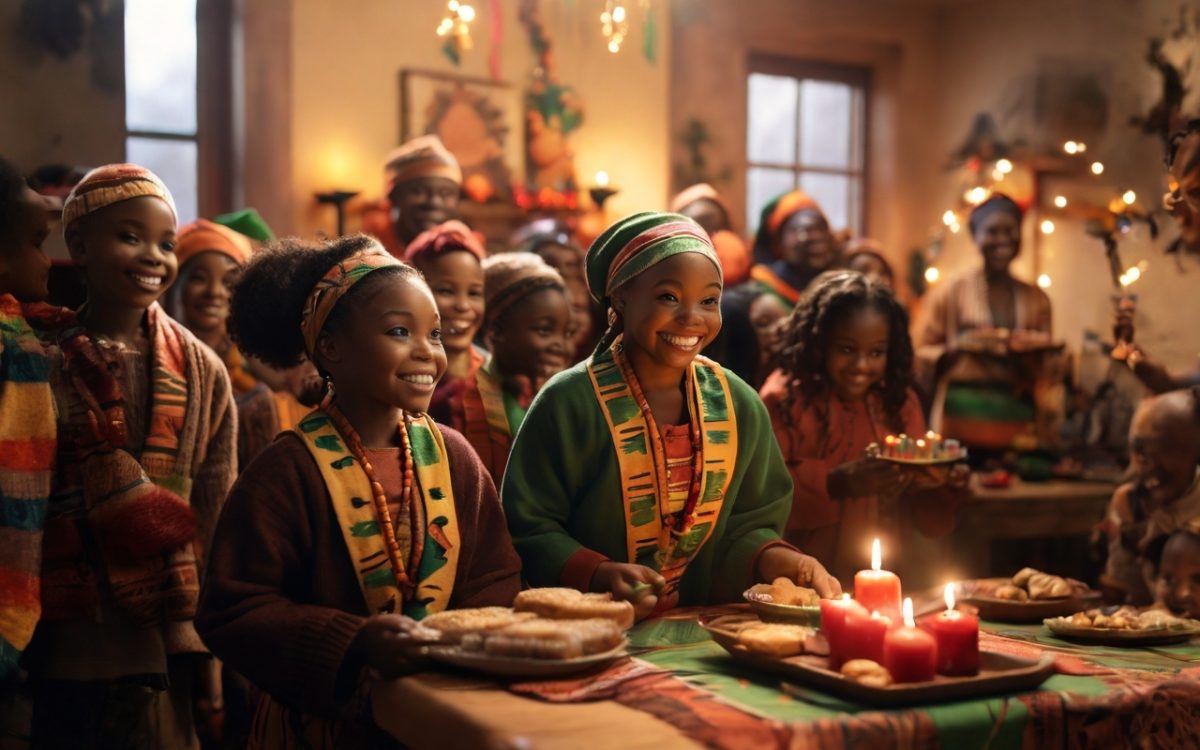(Aha Onye kpọrọ Nkita ya ka ọ na-aza)
Ziad K. Abdrlnour’s saying is a great conversation starter for exploring the Second Kwanzaa principle, Kujichagulia. Ziad says, “For those who understand, no explanation is needed. For those who do not understand, no explanation is possible.”
However, when it comes to Kwanzaa, it’s not about whether an explanation is possible but rather about the need for one. This is even interesting on this second day of Kwanzaa when we celebrate the self-determination of black people.
What is Kwanzaa?
For those who haven’t experienced Kwanzaa, it’s a beautiful annual celebration from December 26th to January 1st. During this time, black families, communities, and allies, mainly in the Americas, reflect on their rich past, present, and future histories and celebrate the vibrant and diverse Pan-African cultural and spiritual heritages. This week-long celebration is a chance to celebrate the dynamic and diverse Pan-African cultural and spiritual heritages and to rediscover their roots.
The Seven Principles of Kwanzaa
The seven principles of Kwanzaa guide our reflection and help us to connect with others. They are Umoja (Unity), Kujichagulia (Self-Determination), Ujima (Collective Work and Responsibility), Ujamaa (Cooperative Economics), Nia (Purpose), Kuumba (Creativity), and Imani (Faith). Kujichagulia, the second principle of Kwanzaa, emphasizes the right of black people worldwide to self-determination in defining, naming, creating, and speaking for themselves.
Sitting down before my window today, I couldn’t help but ponder what led me to this part of the world. I looked around and took in the surroundings, reflecting on my journey so far. Born and raised in Nigeria, I write this reflection from Schefferville, a city bordering Quebec and Newfoundland. A few years back, a journalist from London who worked in Nigeria was amazed when she discovered I was a Nigerian. She agreed Nigerians are known for travelling far and wide, but leaving Nigeria to establish oneself in Schefferville was on another level, she said. I think she was not wrong.
Reflecting upon the first winter I spent in Schefferville, I still remember questioning my decision to come here. The unpredictable weather of this city made me wonder if enduring such harsh conditions was an essential part of following Jesus. It made me question why I left the warm climate of Nigeria to live in a city where stepping out of the house required careful consideration. Even as I write this, the sun is already setting, and it is only 2:30 PM. The temperature may read -12 °C, but the wind howling at 28 km per hour makes the wind chill feel like -22 °C. However, for Schefferville, this is considered a beautiful temperature.
Kwanzaa and the Indigenous People
Thinking about the Kujichagulia principle today, I remember my first contact with the Innu people. I was filled with a burning desire to make a difference in the world when I arrived here. After ten years of religious formation, I felt equipped with all the necessary tools to reignite the mission that, I believed, was slowly dying out. The words of our founder rang in my ears: “I don’t want smouldering wicks; I want you to burn, give heat, give light or get out.”
Shortly after my arrival, I realized that my cultural and spiritual roots had been neglected during my missionary training. So, I embarked on a path with my indigenous brothers and sisters to rediscover the tremendous value of our shared heritage. Together, we have been exploring the power of kujichagulia to name our spiritual experiences, create our story of God, and define how we respond to the invitation of Jesus of Nazareth. Unfortunately, most of our spiritual ceremonies today have been created, formulated, and named for us, thus prompting me to ask “ma o bu eziokwu n’aha Onye kpọrọ Nkita ya ka ọ na-aza?
Photo: Leonardo Ai-generated with the prompt: A cute scene of Kwanzaa celebration of self-determination, cheerful mood, high-resolution image, a beautiful depth






